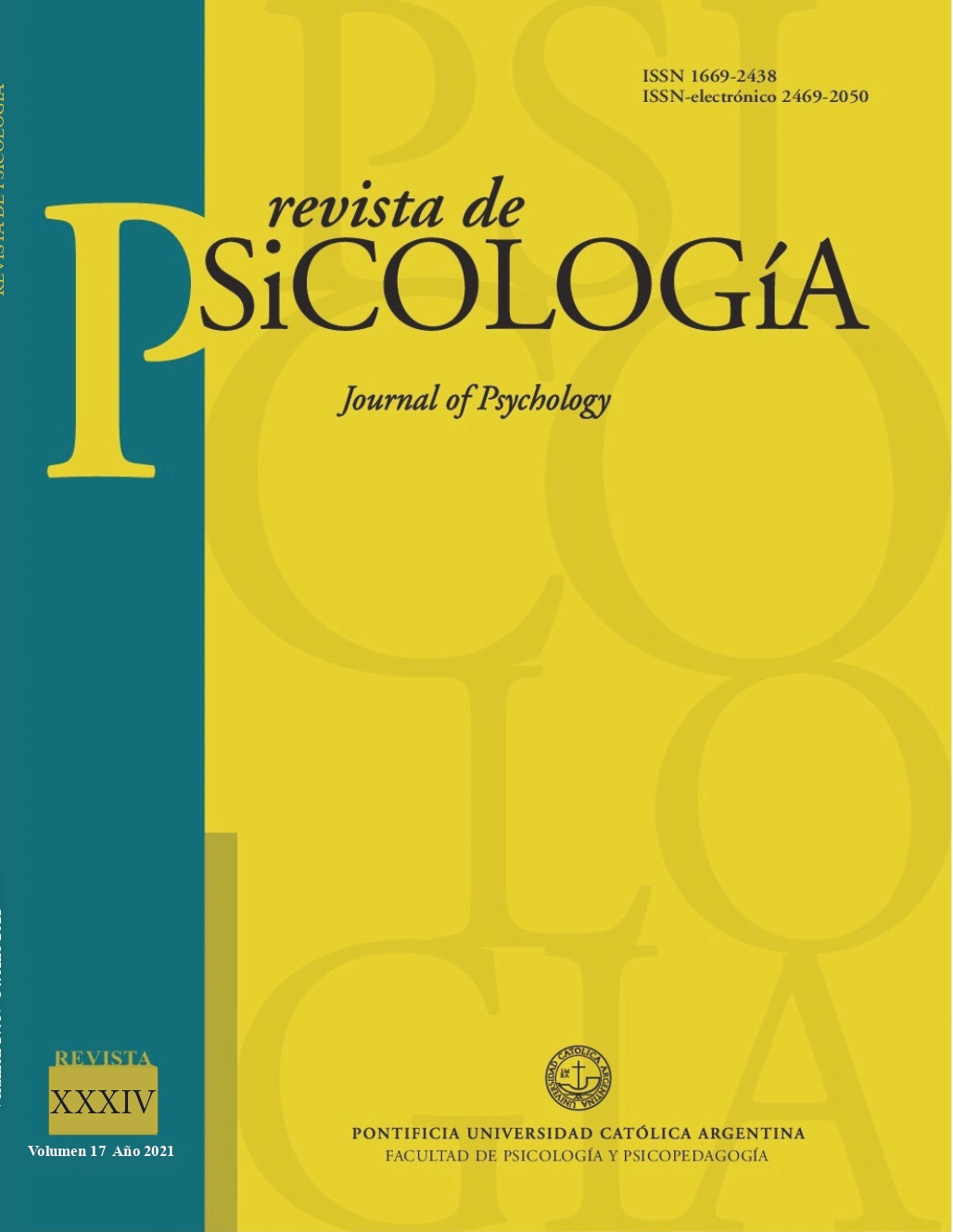Estudio de las propiedades psicométricas de la Escalas de Autocompasión (EAC) en una muestra de profesionales de la salud mental en Argentina
DOI:
https://doi.org/10.46553/RPSI.17.34.2021.p21-34Palabras clave:
autocompasión, validación, propiedades psicométricasResumen
Introducción: El propósito de la presente investigación fue analizar los aspectos métricos de la Escala de Autocompasión (EAC) examinando evidencias de validez de constructo y confiabilidad en una muestra de profesionales de la salud mental en Argentina. Método: Se utilizó un muestreo de tipo no probabilístico y voluntario constituido por 252 psicólogos y psiquiatras residentes en CABA, Argentina. Se diseñó un estudio no experimental, transversal, de tipo instrumental clásico. Resultados: El análisis factorial confirmatorio efectuado permitió verificar la estructura de seis factores. Los resultados informaron correlaciones negativas y significativas entre las dimensiones consideradas teóricamente como opuestas. La consistencia interna es adecuada en todas las subdimensiones y en el total de la escala. Conclusión: La escala cuenta con propiedades adecuadas para su uso en población de CABA, Argentina.Descargas
Citas
Acinas, M. P. (2012). Burn-out y desgaste por empatía en profesionales de cuidados paliativos. Revista digital de medicina psicosomática y psicoterapia, 2(4), 1-22.
Albertson, E., Neff, K., & Dill-Shackleford, K. (2014). Self-Compassion and Body Dissatisfaction in Women: A Randomized Controlled Trial of a Brief Meditation Intervention. Mindfulness, 6(3), 444-454. doi: 10.1007/s12671-014-0277-3
Araya, C., & Moncada, L. (2016). Auto-compasión: origen, concepto y evidencias preliminares. Revista Argentina de Clínica Psicológica, 25(1), 67-78. ISSN: 0327-6716
Araya, C., Moncada, L., Fauré, J., Mera, L., Musa, G., Cerda, J., ... & Brito, G. (2017). Adaptation and preliminary validation of the self-compassion scale in a chilean context. Latinoamerican Journal of Positive Psychology, 3, 47-58. ISSN: 0719-4420
Bollen, K., & Long, J. (1993). Testing structural equation models. Sage.
Brown, T. A. (2006). Confirmatory factor analysis for applied research. Guilford publications.
Browne, M. W., & Cudeck, R. (1993). Alternative ways of assessing model fit En: Bollen KA, Long JS, eds. Testing Structural Equation Models. Sage, 136-162.
Epskamp, S., Stuber, S., Nak, J., Veenman, M., & Jorgensen, T. D. (2019). semPlot: Path Diagrams and Visual Analysis of Various SEM Packages’ Output (Version 1.1. 2)[Computer software].
Fletcher, T. D., & Fletcher, M. T. D. (2013). Package psychometric. Recuperado de http://cran. rproject. org/web/packages/psychometric/psychometric. pdf Vol 4.
Freiberg Hoffmann, A., Stover, J. B., de la Iglesia, G., & Fernández Liporace, M. (2013). Polychoric and Tetrachoric Correlations in Exploratory and Confirmatory Factorial Studies. Ciencias Psicológicas, 7(2), 151-164. Recuperado de http://www.scielo.edu.uy/scielo.php?script=sci_arttext&pid=S1688-42212013000200005&lng=es&tlng=en
García-Campayo, J., Navarro-Gil, M., Montero-Marín, J., López-Artal, L. y Demarzo, M. (2014). Validation of the Spanish versions of the long (26 items) and short (12 items) forms of the Self-Compassion Scale (SCS) Health and Quality of Life Outcomes, 12, (4) 1-9.
Gilbert, P. (2009). The compassionate mind: A new approach to life’s challenges. Oakland, Calif: New Harbinger Publications.
Germer, C. (2011). El poder del "mindfulness": Libérate de los pensamientos y las emociones autodestructivas. Madrid: Paidos.
Germer, C. & Siegel, R. (2012). Wisdom and compassion in psychotherapy: deepening mindfulness in clinical practice. New York, USA: Guilford Press.
Hair, J. F., Black, W. C., Babin, B. J., Anderson, R. E., & Tatham, R. L. (2006). Multivariate Data Analysis. Pearson Prentice Hall.
Hu, L. T., Bentler, P. M., & Kano, Y. (1992). Can test statistics in covariance structure analysis be trusted?. Psychological bulletin, 112(2), 351. https://psycnet.apa.org/doi/10.1037/0033-2909.112.2.351
Hupfeld, J., y Ruffieux, N. (2011). Validierung einer deutschen Version der Self-Compassion Scale (SCS-D). Zeitschrift Für Klinische Psychologie Und Psychotherapie, 40(2), 115-123. https://doi.org/10.1026/1616-3443/a000088
Jorgensen, T. D., Pornprasertmanit, S., Schoemann, A. M., Rosseel, Y., Miller, P., Quick, C., & Garnier-Villarreal, M. (2018). semTools: Useful tools for structural equation modeling. R package version 0.5-1.
Kline, R. B. (2018). Response to leslie hayduk’s review of principles and practice of structural equation modeling. Canadian Studies in Population [ARCHIVES], 45(3-4), 188-95.
Kornfield, J. (2008). The wise heart: a guide to the universal teachings of Buddhist psychology. New York, USA: Bantam Books.
Mantzios, M., Wilson, J. & Giannou, K. (2013). Psychometric properties of the Greek versions of the self-compassion and mindful attention and awareness scales. Mindfulness, 2(3) 89-102. doi:10.1007/s12671-013-0237-3
Muthén, B., & Kaplan, D. (1985). A comparison of some methodologies for the factor analysis of non‐normal Likert variables. British Journal of Mathematical and Statistical Psychology, 38(2), 171-189. https://doi.org/10.1111/j.2044-8317.1985.tb00832.x
Neff, K. D. (2003a). Development and validation of a scale to measure self-compassion. Self and Identity, 2, 223-250. https://doi.org/10.1080/15298860309027
Neff, K. (2003b). Self-compassion: An alternative conceptualization of a healthy attitude toward oneself. Self and Identity, 2, 85-102.
Neff, K. D. (2012). The science of self-compassion. In C. K. Germer y R. D. Siegel (Eds.), Wisdom and compassion in psychotherapy: Deepening mindfulness in clinical practice (pp. 79-92). New York, NY, US: The Guilford Press.
Neff, K. D. (2016). The Self-Compassion Scale is a valid and theoretically coherent measure of self-compassion. Mindfulness, 7(1), 264-274. https://doi.org/10.1007/s12671-015-0479-3
Nunnally, J. C., & Bernstein, I. H. (1994). Psychometric theory (3rd ed.). McGraw Hill.
Pastorelli Rhor, J., & Gargurevich, R. (2018). Propiedades psicométrica de la escala de autocompasión en estudiantes de medicina de Lima. Revista Interamericana de Psicología, 52(2). pp. 246-261. https://www.researchgate.net/profile/Rafael-Gargurevich/publication/330193124_Propiedades_psicometricas_de_la_escala_de_autocompasion_en_estudiantes_de_medicina_de_lima/links/5c599056a6fdccb608a97977/Propiedades-psicometricas-de-la-escala-de-autocompasion-en-estudiantes-de-medicina-de-lima.pdf
Revelle, W. (2018). Psych: Procedures for personality and psychological research (Version 1.9. 12.31)[Computer software]. Northwestern University.
Raes F, Pommier E., Neff, K.D., Van Gucht, D. (2011). Construcción y validación factorial de una forma corta de la escala de autocompasión. Clin Psychol Psychother 2011, 18: 250-255. 10.1002 / cpp.702. doi.org/10.1002/cpp.702
Rosseel, Y. (2017). Lavaan: An R package for structural equation modeling and more. Version 0.5–12 (BETA). Journal of statistical software, 48(2), 1-36.
Schumacker, R., & Lomax, R. (2016). A beginner´s guide to structural equation modeling. Routledge.
Shapiro, S., Brown, K., & Biegel, G. (2007). Teaching self-care to caregivers: Effects of mindfulness-based stress reduction on the mental health of therapists in training. Training and Education in Professional Psychology, 1(2), 105-115. doi: 10.1037/1931-3918.1.2.105
Villanueva, R. A. M., & Chen, Z. J. (2019). ggplot2: Elegant graphics for data analysis. Springer.
Woo Kyeong, L. (2013). Self-compassion as a moderator of the relationship between academic burn-out and psychological health in Korean cyber university students. Personality and Individual Differences, 54(8), 899-902. doi: 10.1016/j.paid.2013.01.001.
Descargas
Publicado
Cómo citar
Número
Sección
Licencia



















